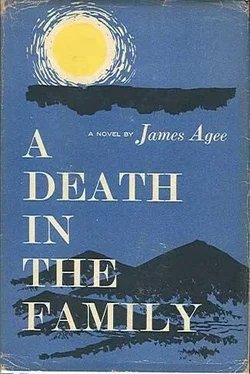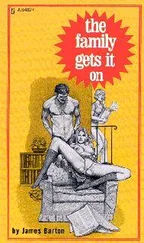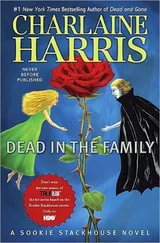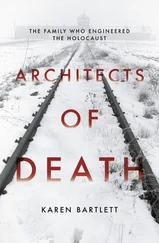I hear my father; I need never fear.
I hear my mother, I shall never be lonely, or want for love.
When I am hungry it is they who provide for me; when I am in dismay, it is they who fill me with comfort.
When I am astonished or bewildered, it is they who make the weak ground firm beneath my soul: it is in them that I put my trust.
When I am sick it is they who send for the doctor; when I am well and happy, it is in their eyes that I know best that I am loved; and it is towards the shining of their smiles that I lift up my heart and in their laughter that I know my best delight.
I hear my father and my mother and they are my giants, my king and my queen, beside whom there are no others so wise or worthy or honorable or brave or beautiful in this world. I need never fear: nor ever shall I lack for loving-kindness.
And those also who talk with them in that room beneath whose door the light lies like a guardian slave, a bar of gold, my witty uncle, and my girlish aunt: I have yet to know them well, but they and my father and my mother are all fond of each other, and I like them, and I know that they like me.
I hear the easy chiming of their talk and their laughter.
But before long now they too will leave and the house will become almost silent and before long the darkness, for all its leniency, will take my father and my mother and will bring them, even as I have been brought, to bed and to sleep.
You come to us once each day and never a day rises into brightness but you stand behind it; you are upon us, you overwhelm us, all of each night. It is you who release from work, who bring parted families and friends together, and people for a little while are calm and free, and all at ease together; but before long, before long, all are brought down silent and motionless Under your sheltering, your great sheltering, darkness.
And all through that silence you walk as if none but you had ever breathed, had ever dreamed, had ever been.
My darkness, are you lonely?
Only listen, and I will listen to you.
Only watch me, and I will watch into your eyes.
Only know that I am awake and aware of you, only be my friend, and I will be your friend.
You need not ever fear; or ever be lonely; or want for love.
Tell me your secrets; you can trust me.
Come near. Come very near.
Darkness indeed came near. It buried its eye against the eye of the child's own soul, saying: Had ever breathed, had ever dreamed, had ever been.
And somewhat as in blind night, on a mild sea, a sailor may be made aware of an iceberg, fanged and mortal, bearing invisibly near, by the unwarned charm of its breath, nothingness now revealed itself: that permanent night upon which the stars in their expiring generations are less than the glinting of gnats, and nebulae, more trivial than winter breath; that darkness in which eternity lies bent and pale, a dead snake in a jar, and infinity is the sparkling of a wren blown out to sea; that inconceivable chasm of invulnerable silence in which cataclysms of galaxies rave mute as amber.
Darkness said: When is this meeting, child, where are we, who are you, child, who are you, do you know who you are, do you know who you are, child; are you?
He knew that he would never know, though memory, almost captured, unrecapturable, unbearably tormented him. That this little boy whom he inhabited was only the cruelest of deceits. That he was but the nothingness of nothingness, condemned by some betrayal, condemned to be aware of nothingness. That yet in that desolation, he was not without companions. For featureless on the abyss, invincible, moved monstrous intuitions. And from the depth and wide throat of eternity burned the cold, delirious chuckle of rare monsters beyond rare monsters, cruelty beyond cruelty.
Darkness said: Under my sheltering: in my great sheltering.
In the corner, not quite possible to detach from the darkness, a creature increased, which watched him.
Darkness said: You hear the man you call your father: how can you ever fear?
Under the washstand, carefully, something moved.
You hear the woman who thinks you are her child.
Beneath his prostrate head, eternity opened.
Hear how he laughs at you; in what amusement she agrees.
The curtain sighed as powers unspeakable passed through it.
Darkness purred with delight and said: What is this change your eye betrays?
Only a moment ago, I was your friend, or so you claimed; why this sudden loss of love?
Only a moment ago you were all eagerness to know my secrets; where is your hunger now?
Only be steadfast: for now, my dear, my darling, the moment comes when hunger and love will be forever satisfied.
And darkness, smiling, leaned ever more intimately inward upon him, laid open the huge, ragged mouth- Ahhhhh…!
Child, child, why do you betray me so?
Come near. Come very near.
Ohhhhhh…!
Must you be naughty? It would grieve me terribly to have to force you.
You know that you can never get away: you don't even want to get away.
But with that, the child was torn into two creatures, of whom one cried out for his father.
The shadows lay where they belonged, and he lay shaken in his tears. He saw the window; waited.
Still the cricket struck his chisel; the voices persisted, placid as bran.
But behind his head, in that tall shadow which his eyes could never reach, who could dare dream what abode its moment?
The voices chafed, untroubled: grumble and babble.
He cried out again more fiercely for his father.
There seemed a hollowing in the voices, as if they crossed a high trestle.
Serenely the curtain dilated, serenely failed.
The shadows lay where they belonged, but strain as he might, he could not descry what lay in the darkest of them.
The voices relaxed into their original heartlessness.
He swiftly turned his head and stared through the bars at the head of the crib. He could not see what stood there. He swiftly turned again. Whatever it might be had dodged, yet more swiftly: stood once more, still, forever, beyond and behind his hope of seeing.
He saw the basin and that it was only itself; but its eye was wicked ice.
Even the sugar curtains were evil, a senselessly fumbling mouth; and the leaves, wavering, stifled their tree like an infestation.
Near the window, a stain on the wallpaper, pale brown, a serpent shape.
Deadly, the opposite window returned his staring.
The cricket cherished what avaricious secret: patiently sculptured what effigy of dread?
The voices buzzed, pleased and oblivious as locusts. They cared nothing for him.
He screamed for his father.
And now the voices changed. He heard his father draw a deep breath and lock it against his palate, then let it out harshly against the bones of his nose in a long snort of annoyance. He heard the Morris chair creak as his father stood up and he heard sounds from his mother which meant that she was disturbed by his annoyance and that she would see to him, Jay; his uncle and his aunt made quick, small, attendant noises and took no further part in the discussion and his father's voice, somewhat less unkind than the snort and the way he had gotten from his chair but still annoyed, saying, "No, he hollered for me, I'll see to him"; and heard his mastering, tired approach. He was afraid, for he was no longer deeply frightened, he was grateful for the evidence of tears.
The room opened full of gold, his father stooped through the door and closed it quietly; came quietly to the crib. His face was kind.
"Wuzza matter?" he asked, teasing gently, his voice at its deepest.
"Daddy," the child said thinly. He sucked the phlegm from his nose and swallowed it.
His voice raised a little. "Why, what's the trouble with my little boy," he said and fumbled and got out his handkerchief. "What's the trouble! What's he crine about!" The harsh cloth smelt of tobacco; with his fingertips, his father removed crumbs of tobacco from the child's damp face.
Читать дальше












